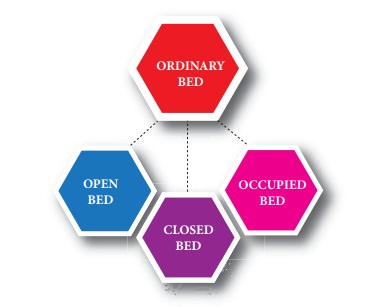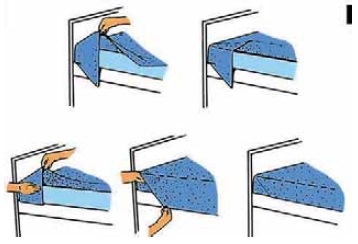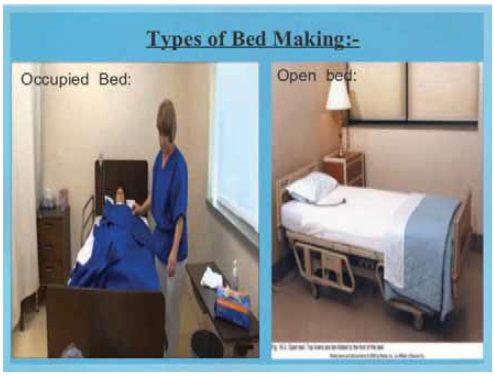Nursing - Bed Making | 11th Nursing : Chapter 7 : Hygiene - Patient and their Environment
Chapter: 11th Nursing : Chapter 7 : Hygiene - Patient and their Environment
Bed Making
Bed Making
Bed making is an art. Skillful bed making contributes materially to the patient’s comfort. Clean and
comfortable bed includes the patient’s unit in the hospital.
PURPOSE
1.
To provide clean and comfortable bed to the patient.
2.
To observe and prevent patient’s complications.
3.
To save time, effort and material
4.
To provide a neat appearance of the ward.
TYPES OF BED
The beds are of two
types, ordinary and special bed.
Types of ordinary bed

Types of ordinary bed
a.
Open (simple bed):- This is prepared for an ambulatory patient.
Indication: - To provide a clean
smooth comfortable bed to the patient.
b.
Closed (unoccupied bed):- This is an empty bed in which the top covers are arranged in such a way
that all bed spread is fully protected from dust and dirt. On arrival of the
patient, this bed is converted into open bed.
Indication: - Keep the bed ready for receiving the new patient in it.
Special beds
a.
Admission bed: - This is for newly admitted patient.
Indications:-
1.
Provide minimum disturbance to the patient.
2.
Protect bedlinen during admission bath and leave a fresh bed for
the use.
b.
Post-operative bed: - This is prepared for the patient who has undergone surgery.
Indication: - Protect bed linens
from vomiting, bleeding, drainage and discharges.
c.
Fracture bed: - This is a hard firm
bed designed for the patient with fracture particularly of spine
pelvis and femur.
Indications:-
1.
Aid in immobilizing the fracture.
2.
Provide warmth and comfort
3.
Prevent sagging of the mattress.
Plaster bed: - This is a hard bed designed for the patient with fracture TB spine.
Indications:-
1.
Aid in immobilizing the part until the plaster dries.
2.
Aid in drying the plaster in correct position and shape.
Amputation or stump bed: - In this type of bed the top
bed clothes are divided or split. This is used for the patient with amputation
of legs.
Indications
1.
Take the weight of the clothes off the side of the amputated
limb or stump.
2.
Keep the stump in good position
3.
Watch stump for hemorrhage constantly and apply tourniquet if
necessary.
Cardiac bed: - This is prepared for a patient with heart disease.
Indications:
1.
Relieve dysponea.
2.
Prevent complications.
3.
Provide comfort to the patient.
4.
Asset in recovery of the patient.
Renal bed: - This is prepared to provide extra warmth
to the patient.
Indications:
1.
Provide comfort to the aching joints in patients with acute
rheumatism.
2.
Improve perspiration for excretion of waste products in case of
nephritis.
Burns bed: - This is prepared for a patient with burns.
Indications:-
1.
Prevent infection to the burnt area.
2.
Help in healing of the burnt area.
3.
Prevent the patient from sticking to the sheet as a result of
exudates oozing from the burnt area.
Bed Making- Open Bed
Equipments
1. Cot, 2.Duster,
3.Chair and stool, 4. Protective sheet, 5.Bed linen, i-e mattress, mattress
cover, bottom sheet one, draw sheet one, Pillow, Pillow cover, top sheet,
blanket
Nursing Activity
1.
Collect and take the supplies to the bed side.
2.
Place the supplies on the stools
3.
Tidy the shelves and move the locker little away.
4.
Explain the patient that you are going to make his or her bed.
5.
Maintain patient’s privacy by using screen.
6.
Wash your hands
7.
Make the bed as mentioned below accordingly.
Procedure
1.
Assist the patient out of bed as necessary and offer chair to
sit.
2.
Remove any equipment attached to the bed linen.
3.
Adjust the bed in flat position to a comfortable height to
prevent straining your back.
4.
Strip the bed clothes, fold them one by one and place on the
back of a chair, in case to be reused. Remove the mattress cover and bed cover
fold and keep them also.
5.
Dust the bed with damp duster and mattress with dry duster. Turn
the mattress.
6.
Spread the bed cover on the bedsprings to protect the under
surface of the mattress. Put on the mattress cover. If it is loose the excess
can be tucked under the mattress pull the mattress to the top.
MAKING TRIANGULAR FOLD

Packing up the top sheet
Sheet on top of mattress in a triangular fold
Lower edge of sheet tucked under mattress
Triangular fold making
Triangular fold placed over side of mattress
Linen tucked under mattress
7.
Place the bottom sheet at the foot of the bed same side down
with the lower head with the edge of the mattress and the center fold on the
center of the bed. Then unfold the upper layer onto the head of the bed.
8.
Tuck in excess sheet at the head of the bed.
9.
Miter the corner as below at the head end of the bed, making
smooth and neat corner.
a.
Pick up the side edge of the sheet, so that the sheet forms a
triangle with the head of bed and the side edge perpendicular to the bed.
b.
Hold the sheet against the side of the mattress using the palm
of your hand and tuck of excess sheet under the mattress.
c.
Drop the sheet from your top hand to the side of mattress.
10.
Miter the corner as above at the foot end of the bed.
11.
Tuck the sheet under the mattress from head to foot of bed on
one side.
12.
Place a protective sheet and draw sheet in the middle of the bed
with the center fold on the center of the bed and unfold. Then tuck in on one
side.
13.
Place the top sheet at the head of bed. Same side up with the
top head even with the head of mattress and the center fold on the center of
the bed, then unfold the upper layer on to the foot of the bed.
14. Make a vertical or
horizontal toe pleat as under while tucking the top bed clothes at the foot of
the bed.
15.
Vertical pleat. Fold a six inches pleat lengthwise in the top
clothes from the center to the foot end, at the center of mattress.
16.
Horizontal pleat – fold a two inches pleat across the top
clothes at the centre of foot of the mattress.
17.
Tuck in the excess sheet, and bed spread together at the foot of
the bed.
18.
Milter of corner of top clothes at the foot of bed as in step 9
allowing the top linen to hand over the side of the bed.
19.
Repeat the procedure on the opposite side pull the linen tight
and smooth out any wrinkles.
20.
Fold back the top sheet at the head of the bed to the shoulder
height.
21.
Put the clean pillow cover on pillow and place the pillow at the
center of the head of bed with open end of the cover away from the door of the
room.
22.
Fan fold the top clothes toward the foot of the bed or pie fold
them as under for easy entering.
FAN FOLD
·
Fold the half of the top clothes toward the foot of the bed
which is further folded into 2-3 according pleats so that the top clothes are
at the foot end of the bed.
·
Pie fold place one finger at the center of the top clothes
facing the head of the bed. Lift the edge of the top clothes and fold it back
toward making a triangle.

Related Topics